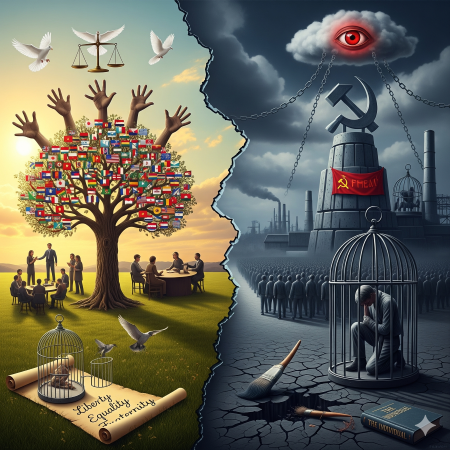How has forced collectivization or rigid state control caused famine, poverty, and suffering?

Forced collectivization and rigid state control under communist regimes have caused widespread famine, poverty, and suffering by disrupting traditional agriculture, removing economic incentives, and leading to systemic inefficiency.
The abolition of private land ownership and the concentration of power in the hands of a central authority created an environment where economic policies were often divorced from the realities on the ground.
Famine as a Result of Central Planning
One of the most catastrophic consequences of forced collectivization was the series of man-made famines in the 20th century. By seizing privately-owned farms and livestock, the state disrupted the agricultural knowledge and practices that had sustained rural populations for generations. The most infamous examples include:
-
The Holodomor (Ukraine, 1932-1933): Under Joseph Stalin's rule, the Soviet government forcibly collectivized farms and imposed impossibly high grain quotas on the Ukrainian peasantry, known as the "breadbasket of Europe." The state confiscated all food to feed the cities and fund industrialization, leaving millions to starve. The Soviet government sealed the borders of Ukraine to prevent people from fleeing and deliberately withheld aid, causing an estimated 3.9 million deaths.
-
The Great Chinese Famine (1958-1962): As part of Mao Zedong's "Great Leap Forward," rural communities were forced into communes, and agricultural production was dictated by central planners who had no understanding of farming. Peasants were diverted from their fields to work on unproductive industrial projects, while exaggerated crop reports from local officials led the government to seize grain, believing there was a surplus. This man-made catastrophe led to the deaths of tens of millions of people.
Widespread Poverty and Economic Suffering
Beyond famine, rigid state control created long-term economic suffering and poverty.
-
Lack of Incentives: The absence of private ownership and the profit motive meant that farmers and factory workers had little reason to work hard or innovate. Since the state owned everything and provided for its citizens, a culture of low productivity and inefficiency became widespread.
-
Shortages and Inefficiency: Central planners in faraway cities often made decisions with flawed data, leading to a misallocation of resources. This caused frequent shortages of essential goods—from food to clothing to basic tools—while other products sat in warehouses unsold.
-
Black Markets: The economic stagnation and shortages of essential goods led to the rise of informal black markets. Citizens had to barter or pay exorbitant prices for items that were scarce or unavailable through official channels, which created a parallel economy of corruption and further suffering for those who could not afford it.
- Questions and Answers
- Opinion
- Motivational and Inspiring Story
- Technology
- Live and Let live
- Focus
- Geopolitics
- Military-Arms/Equipment
- Segurança
- Economy
- Beasts of Nations
- Machine Tools-The “Mother Industry”
- Art
- Causes
- Crafts
- Dance
- Drinks
- Film/Movie
- Fitness
- Food
- Jogos
- Gardening
- Health
- Início
- Literature
- Music
- Networking
- Outro
- Party
- Religion
- Shopping
- Sports
- Theater
- Health and Wellness
- News
- Culture

